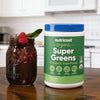Building a Better Brain with Lion's Mane

Do you ever feel like you could use a brain boost?
If the answer is yes, then you’re not alone. It’s no secret that processed foods have led to decline in nutrition quality over the past few decades, and on top of that, Americans are getting less sleep than ever.
Common practice is to counter this “brain fog” with stimulants like caffeine. However, these can have detrimental effects on health and lead to such outcomes as poor sleep quality and dependence.

Instead, many people are turning to natural nootropics for the brain boost they’re looking for. Nootropics (sometimes called “smart drugs”) are a class of substances which are said to improve mental acuity and brain performance.
Of these natural nootropics, lion’s mane has risen to the top as a favorite option for many, and though difficult to find in grocery stores, is widely available in supplement form.
What is Lion’s Mane?
Lion’s mane is a mushroom whose name is derived from its unique appearance. Rather than the usual “stem and cap” shape of most mushrooms, lion’s mane has a shaggy appearance, often resembling a snowball.
Hericium erinaceus (the scientific name for lion’s mane) is also known as pom pom, bearded tooth, and yamabushitake, and its medicinal use in eastern medicines has been common practice for centuries.

Studies have found that lion’s mane contains two special compounds which may stimulate the growth of brain cells: hericenones and erinacines. These compounds work by promoting NGF (Nerve Growth Factor) biosynthesis.
Benefits to Cognitive Health
Research on the effects of lion’s mane on cognitive health is still new, but what studies we have are promising.
One study conducted with 50-80 year-old Japanese men and women diagnosed with mild cognitive impairment observed improved cognitive function in patients who took four 250mg tablets of lion’s mane dry powder three times a day for 16 weeks. Cognitive function increased with the duration of the intake. A similar result was seen in another study spanning 49 weeks.
Interestingly, a third study noted that while cognitive function increased while taking lion’s mane, it also decreased significantly after the study’s termination when lion’s mane supplementation ceased.
Benefits for Nerve Health
NGF (Nerve Growth Factor) is essential for maintaining brain health. It stimulates the growth and repair of nerves. Hericenones and erinacines found in lion’s mane can induce NFG synthesis in nerve cells.
While human studies are scarce, studies performed with rats have shown promising signs that lion’s mane may be an effective treatment for nerve damage. In one study, rats with nerve damage were observed after treatment with lion’s mane extract.
The study found that rats treated with lion’s mane extract experience a return of hind limb function and normal toe spreading earlier than the control group. Regeneration of axons in the brain was also accelerated in the group given lion’s mane extract.
Other Potential Benefits of Lion’s Mane
Though lion’s mane is most commonly used for its cognitive benefits, other potential uses are less well known. Below, you’ll find a quick list of some of the other commonly stated benefits of lion’s mane.
- May help relieve mild symptoms of depression and anxiety
- May prevent ulcers
- May reduce the risk of heart disease
- May help manage diabetes symptoms
- Reduces inflammation and oxidative stress
- May provide immune benefits
This article focuses primarily on lion’s mane as a nootropic. For more information on these other benefits, there are fantastic resources available from many sources online, just make sure the source you use is trustworthy!
What to Look For When Buying Lion’s Mane
Odds are, you’ve never bought mushrooms except at the supermarket. With so many untrustworthy sellers on the market, what do you need to know to make sure you’re getting the highest quality lion’s mane?
- Check labels to make sure the product is organic.
- Check to see if the product has been third party tested. The FDA doesn't regulate supplements as medicine, so often the only way to ensure a product's quality is through unbiased, third-party testing.
- For best effectiveness, your lion’s mane should contain high levels of beta-glucans and low levels of starch.
- Most importantly, stay away from supplements which use mycelium rather than the fruiting body of the mushroom. Mycelium is a network of filaments similar to roots which all mushrooms possess. As a cost cutting measure, some suppliers will grow mycelium on grain which is then pulverized and sold as lion’s mane.
Not only is mycelium less potent than the fruiting body (in other mushrooms, this would be the cap. For lion’s mane it is the shaggy exterior), but supplements using mycelium contain large amounts of grain. Because this process doesn’t require growing the full mushroom, it is much faster and cheaper to produce. This leads to low quality.
The Final Word
The benefits of lion’s mane are only just beginning to be understood. Those who use it often report a sharper mind and higher levels of focus. It has even been used by those who’ve recently suffered nerve damage in some part of their body.
As time passes and the body of research grows, it is expected that lion’s mane will graduate from being seen as a fringe treatment to something much more commonplace.
Sources
https://www.ncbi.nlm.nih.gov/pmc/articles/PMC5987239/
https://www.ncbi.nlm.nih.gov/pmc/articles/PMC3924982/
https://www.frontiersin.org/articles/10.3389/fnagi.2020.00155/full
https://pubmed.ncbi.nlm.nih.gov/18844328/
-
Posted in
Cognitive Health











